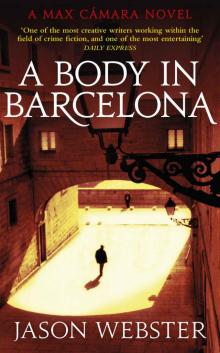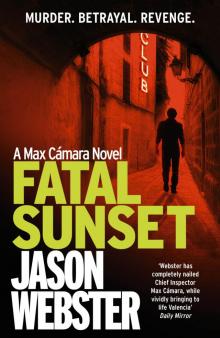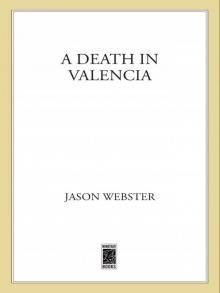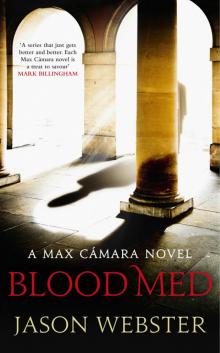- Home
- Jason Webster
Sacred Sierra Page 6
Sacred Sierra Read online
Page 6
Strips of plastic were hanging mysteriously from the almond trees when I reached Arcadio’s fields, but there was no sign of any beehives. However, I noticed that the sound of the bees, that wonderful background hum of life and energy, was several decibels higher than up at the house. The almonds weren’t in bloom, so it seemed I might be on the right track.
I carried on, pushing my way through the grass, trying to let the sound of the bees itself lead me to their hives. Finally I caught sight of something above my head. I walked up to the terrace wall and stood on tiptoe: there in front of me were at least fifty beehives, wooden boxes painted grey, with thousands upon thousands of bees hurrying in and out of tiny holes at the base of each one. My eyes widened as two thoughts simultaneously crossed my mind: firstly of the enormous amount of honey that must be produced right here under our noses; and secondly that I mustn’t breathe a word of this to Salud. It was bad enough with all the spiders, wasps and sundry beetles and flying bugs that disturbed her up here in the mountains; if she discovered the presence of a vast bee colony this close she might leave and never come back.
At that moment I heard the familiar sound of Arcadio’s old Land Rover driving down the track behind me. Soon he had pulled up and was walking over with his usual crusty half-smile.
‘These hives yours?’ I asked him as we shook hands. He glanced over at the bees, then back at his car, then finally looked me in the face.
‘Forty-five euros each,’ he said. A series of thoughts passed through my mind in the space of about a second: what was he talking about? I wasn’t asking how much they were. But then maybe in the back of my mind I was interested in having some hives of my own. Why else was I down here investigating in the first place? The old man knew perfectly well what I was after, more than I did myself. But what on earth was I going to say to Salud? Yes, but think of the honey we’d have! Surely she’d grow to love them once we’d lined the cupboards with jars of our own honey.
‘I’ll take two,’ I said.
But Arcadio didn’t want me to take two of the hives from down here: he wanted me to have a couple from some other hives he had higher up the mountainside, on the slopes of Penyagolosa.
‘We’ll go and pick them up now,’ he said. ‘Shouldn’t take long.’
We set off in his hard, utilitarian vehicle down the mountain and along the dirt track that led to the village. The hives were, at least according to what he’d told me, in the opposite direction.
‘Only way to get there,’ he said. ‘Stone’s throw away from your place, but this is the only track available.’ After several miles of the normal road, we were quickly back on the dirt variety after he took a sharp turn. Despite bumping along in his Spartan, suspension-lite car, it felt good somehow to be back trundling along rocky paths – Arcadio, with his leathery skin, thick-fibre clothes and flat cap looked out of place anywhere but in this rough landscape.
Penyagolosa came into view as we emerged from behind a cluster of pine trees and turned a hairpin bend on the edge of a steep incline. Our land was on the edge of the Penyagolosa massif, but the peak was hidden from view unless we climbed high up the other side of the valley. Despite its modest height, it was a magnificent mountain, strong and powerful, towering over the other hills and summits below it, the red, rusty stripe running diagonally through its exposed rockface like war paint.
‘They say it’s magical, that mountain,’ Arcadio said as he negotiated the deep trenches and dips in the track. ‘Dragons and stuff.’
We carried on driving for what seemed an age before Arcadio eventually brought the car to a halt outside an abandoned mas just off the track. We stepped out and he trotted over purposefully towards the broken buildings. There didn’t seem to be bees anywhere. I looked out over the horizon: we were higher up now, and the air was sharper and cooler. The grass looked greener, darker, as though more rain fell here than back down on the farm, while the pine trees were shorter, their trunks blacker than the pale pines we had. Many of them seemed virtually stripped of needles and had mysterious white fluffy balls hanging in the branches, not unlike candyfloss.
I heard footsteps behind and Arcadio emerged again holding something brown and hard in his hands.
‘Cow dung,’ he said victoriously. ‘Dry cow dung: we burn it and it calms the bees down.’ From my paltry knowledge of beekeeping I recalled images of people in white outfits calmly puffing smoke out of cans on to the hives before extracting honey. But were all those genteel amateur beekeepers in the Home Counties really using cow shit?
‘Arcadio,’ I asked, ‘what are those fluffy lumps on the trees?’
‘Procesionaria,’ he said. Parasitic insects, he explained, that walked in long processions – hence the name – and infected the trees and almost killed them by building their nests in them.
‘Big problem,’ he said. ‘Nothing you can do. Sometimes hunters just shoot them out of the tree.’
He got back in the car and fired up the engine: we had to get going. I looked mournfully at the dying trees for a second and then climbed in to join him.
After another ten minutes we reached an overgrown terrace. Arcadio pulled the car over, scraped it through some thick bushes and then brought it to a stop. Along the edge of the terrace, up against a wall, were half a dozen hives. They looked more like old fruit boxes that had been converted into bee homes, with a simple metal sheet nailed on to the lid in an attempt to make them waterproof. Meanwhile the hole at the bottom where the bees flew in and out looked as if it had been carved with a penknife, and even then only as an afterthought.
Forty-five euros each, I thought to myself. I should have haggled.
Arcadio opened the back of his car and pulled out an old canvas sack stuffed with a couple of dirty old beekeeper’s jackets complete with protective hood.
‘Try this,’ he said. ‘Used to be my father’s.’
I put it on: it was four or five sizes too small.
‘That’s all there is,’ he said. I noticed that he’d kept the better-looking outfit for himself. ‘Put some gloves on and you’ll be fine.’ The sleeves barely reached past my elbows.
I had no idea how we were now going to proceed, but assumed Arcadio, as the master beekeeper, would have a master plan for transporting the hives back to the farm, one that doubtlessly involved as little stress – both to the bees and to ourselves – as possible. But I was wrong.
Placing a lighter under one of the lumps of cow dung, he got it smoking a bit, waved it for less than a second at one of the hives and then called over to me: ‘Right,’ he said, ‘take that one to the car.’
Just like that, with no more preparation? Weren’t the bees going to be slightly annoyed by me simply picking up their house and putting in the back of an ancient Land Rover? Didn’t he have some kind of protective sheet, perhaps, that he could throw over the thing to keep all the bees safe – from us?
I walked as calmly as I could to the hive he had indicated and went to pick it up. The first thing I noticed was that it was heavier than I had anticipated, so I found myself immediately straining and going red in the face as I lifted it up and started stumbling towards the car. The second thing I noticed was that the bees, quite predictably, were less than amused by the catastrophe besetting their quiet abode and were starting to fly and circle around me with a particularly aggressive sounding buzz. And the third thing I noticed was that these upset and naturally violently disposed bees had discovered a convenient hole in my trousers – in my crutch.
I have never pulled my trousers down so quickly. Quite how I got the hive back on the floor beforehand to free my hands I can’t remember. All I do remember was exposing myself on the mountainside in front of an elderly farmer as a swarm of killer insects realised that my Achilles heel wasn’t on my heel at all. My body seemed to react faster than my mind could possibly ever do, survival of my procreational capacity suddenly overriding all other processes in my biological machine. With my trousers hanging down around my knees I hopped and s
kipped as far away from the hive as I could, my hands flicking and swatting like rotor blades to remove the deadly foe from their intended target. No bee was going to sting me down there, no matter what.
The bees, though, were smarter than me, and simply changed their military objectives: as I swiped and cleared them away, an advance party was crawling up the inside of my shirt looking for new targets.
With a shriek I felt two of them sting me simultaneously on the belly. The pain was incredible, like searing hot needles pressing deep into the skin. With a gasp I fell to the floor, beating out the other bees and gripping my stomach. Arcadio stood over me, the smoking cow turd still in his hand. The bees seemed to vanish as soon as he appeared.
‘You better pull your trousers up,’ he said. ‘They might be coming back for more.’
An hour later we were back at the farm, two hives somehow sitting in the back of the car. The stings hurt so much I’d thought I was going to be sick during the return journey, jolting around on the bumpy road. Good job I wasn’t in the army, I thought, if a couple of beestings could almost do me in. There wasn’t even any blood. Arcadio drove straight to the house and called out for Salud.
‘Bring some olive oil,’ he said. Moments later Salud was dabbing oil on a couple of mounds that had developed on my belly. I was in too much agony to wonder why, but almost instantaneously the pain disappeared, as if by magic. It was so surprising that I sat up with a start.
‘Did the oil do that?’ I asked incredulously. Arcadio nodded.
‘Swelling’ll take a day or so to go down. By tomorrow you’ll have forgotten it.’
And he started to recite:
La Verge Maria
quan pel món anava
amb oli de cresol
tot ho curava.
When the Virgin Mary
Walked the Earth
She cured all illnesses
With the oil from her lamp.
‘Used to use olive oil in their lamps, see,’ Arcadio explained. ‘It’s good for lots of things.’
I felt ashamed at how feeble I’d been. A couple of beestings!
‘Better set them up, then,’ he said.
‘You’re putting those hives here?’ Salud asked.
‘I’ll explain later,’ I said, and rushed out of the door.
We drove Arcadio’s car down to a patch of land below the house, next to a white stone outbuilding. Picking up a couple of pallets I’d found lying around, we laid them down next to an olive tree and then carefully carried the hives out and placed them on top. Arcadio, I noticed, was careful to smoke them more thoroughly this time. I wondered if we’d brought a particularly vicious strain of bee into our lives. That would take some explaining …
‘Turn them round so the entrance faces the east,’ Arcadio ordered. I did as he said, while he placed a heavy stone on top of each hive to keep the lid firmly down.
‘They like to wake up facing the sun,’ he explained. It seemed such a happy image – cute little bees getting up in the morning and heading off to spend the day mooching around the flowers. It was easy to forget for a moment how nasty they could be. I rubbed my stomach gently: the lumps were still delicate and swollen. Bees were the source of all that was sweetness and light, they used to say: sweetness from the honey, light from the candles made from their wax. Right at that moment, though, I never wanted to see another one of the little sods again.
*
Salud and I had been together for almost seven years. Marriage, for me, was really more about a state of mind than a ritual performed by a celibate man in a frock, or, even worse, a piece of paper signed by a civil servant. Salud, as far as I was aware, felt more or less the same, and we’d been calling each other husband and wife for some time. Who else could really know the truth of the commitment between us more than we ourselves? God? Perhaps, but I suspected there was little connection between Him and the clergy. The state? The idea was risible.
And yet Salud’s comment struck a chord. I had never been a great one for rituals: I was never baptised or christened, never confirmed, and missed the graduation ceremony after leaving England for Spain when I finished my degree. I even failed to have a TB jab at school – another minor rite of passage. I didn’t mind any of this: not going through the official bit of ‘getting married’ just seemed a natural continuation of a long trend.
But something about being on the mountain was changing me. Here I was experiencing a world entirely bound by natural rhythms, where the beginnings and ends of earthly cycles were carefully marked and registered: symbolic doorways through which one passed from one world into another: from summer into autumn, from harvest time to sowing time, dry seasons to wetter seasons. I had known all this at an intellectual level, but now I was beginning to develop a different sense of what these rituals might mean – an understanding that had nothing to do with rational understanding. It was emotional – rituals spoke directly to your feelings with their colour and pageantry – but it was something else as well, something I was struggling to define, something about being connected to the land, about being earthed in some way.
Marriage – before I came here I could scarcely have thought I would ever do something like that. Now, though, the concept was beginning to feel less alien to me. The earth itself, in a gentle, undemanding sort of way, seemed to be taking us there.
*
The twelfth of October – El Día del Pilar, Spain’s national day. It has been fairly quiet here – most of the festivities take place either in Madrid, with a massive military parade, or in Saragossa, where the ‘Virgin of the Pillar’ resides in the cathedral. It marks the proper beginning of autumn, though, and the approach of winter – the sun is already setting behind the Picosa at around six these days.
Salud received a telephone call from her mother. ‘Should be getting busy up there soon,’ she said. Salud didn’t know what she meant. ‘Hunting season officially starts today,’ she explained.
Mountainsides all over Spain, it seems, are now crawling with armed men. There’s plenty to take a potshot at up here: a family of partridges has taken up residence in the ruins of the lean-to next door. Birds can be shot anytime, Salud’s mum says; wild boar can only be hunted on Thursdays and Sundays. Today is a Thursday. I look out of the window but can’t see anyone. If the boar have any sense they’ll have taken off further up the mountain looking for sanctuary. From what little I know, the laws on hunting are complicated. I’ve got the horrible feeling that hunters can wander all over our land without us being able to do anything about it. God knows I’ve found enough spent shotgun cartridges lying about.
*
It finally felt properly autumnal for the first time that day, with thick, heavy skies and damp earth, from the overnight showers. Something must have clicked in Salud’s mind, for she suddenly smiled and uttered the word ‘rovellones’ over breakfast, and declared we would head out and spend the morning looking for this highly prized wild mushroom. Rovellones are saffron milk caps – aptly named lactarius deliciosus in Latin – and tend to grow on and around pine trees.
After a quick unsuccessful sortie around the few pines growing near the house, we headed out along the dirt track leading past the bend in the gulley and up towards the ruins of the old shepherd’s house. Arcadio had told me they had found the old guy dead up here a few years before, no one having seen him for about a month. He had lived on his own with a few animals, and judging by the chaos of remains left rotting in his house he seemed to have spent most of his time eating tins of tuna, praying to the Virgin Mary and looking at porn magazines – there was some vintage 1970s stuff lying around: black and white photographs and all the men with big bushy moustaches.
A stand of pines nearby seemed to have survived the fire, although they weren’t easy to reach: we had to cut a path through the wilderness, jumping down from terrace to terrace like mountain goats in order to get to them. It was fascinating to see how, in such a short distance from the house, there was a subtle but noticeabl
e change in the flora – the trees seemed more luscious, somehow.
We spent about an hour looking for the rovellones. I’d never seen them in the wild before – only ever at the markets, all bright orange with green spots – and Salud had to point them out to me, bunched up around the base of the pine trees and hiding under tufts of grass. For some reason they didn’t look quite so brightly coloured out in the open. We only managed to half-fill her basket, so we pushed on further, forcing our way as best we could through the gorse, looking for more groups of pine trees, or just the remains of those that hadn’t survived the fire. Salud had some kind of sixth sense for them, and we eventually came across our biggest haul on the slopes of a hill where there appeared to be no sign at all of any trees. But we found some blackened stumps, and there they were growing by the dozen.
And so we had rovellones for lunch. The traditional way of cooking them, with fresh green garlic, is as follows.
Pour a few drops of very good olive oil in a frying pan along with a sprinkling of salt. The rovellones should be washed, dried and cut into strips about half a finger’s width. Chop the spring garlic finely, along with the green stalks. Place this first into the frying pan, with the heat turned up high. After about thirty seconds add the rovellones and cook until soft. Add more salt if required. When done, sprinkle with chopped parsley and eat immediately. The garlic and parsley help bring out the delicate flavours of the rovellones. Works well with chunks of fresh bread as a starter.
*
At eight o’clock one Sunday morning I was woken by the sound of gunfire very close to the farm. One of things we’d had to deal with living so far out in the countryside away from any towns or villages was an urban fear of isolation, so often expressed in subconscious images of wild axemen coming in off the hillside to do you in. ‘On a mountain no one can hear you scream …’ Typical horror-movie stuff. But these nightmares almost invariably took place in a night-time setting. I had never expected bloodthirsty killers to show up at this tranquil time of day.

 Violencia
Violencia Or the Bull Kills You
Or the Bull Kills You The Killing of El Niño Jesús
The Killing of El Niño Jesús The Spy with 29 Names
The Spy with 29 Names Duende
Duende Guerra
Guerra Sacred Sierra
Sacred Sierra A Body in Barcelona: Max Cámara 5
A Body in Barcelona: Max Cámara 5 Fatal Sunset
Fatal Sunset A Death in Valencia
A Death in Valencia Blood Med
Blood Med Andalus
Andalus